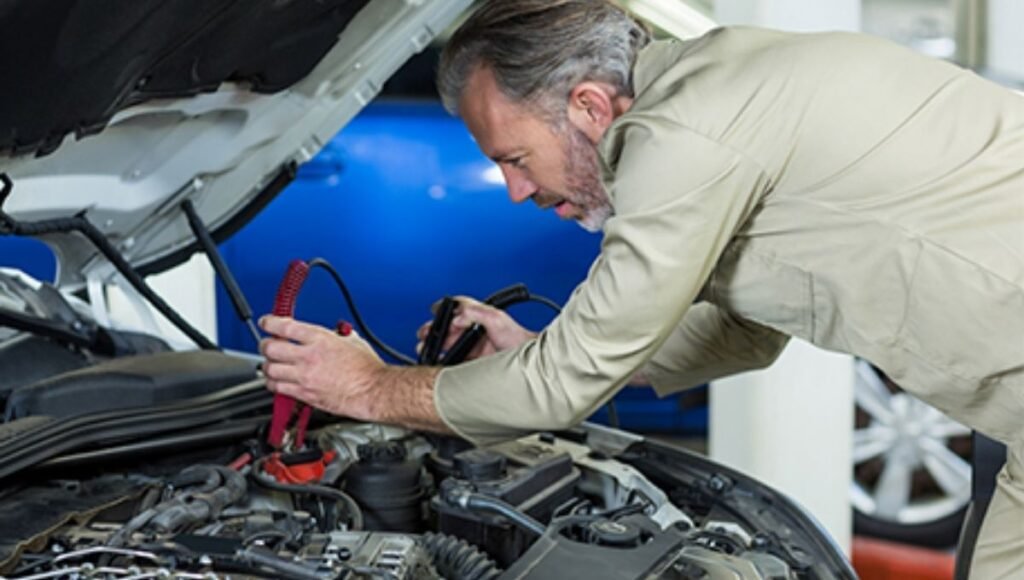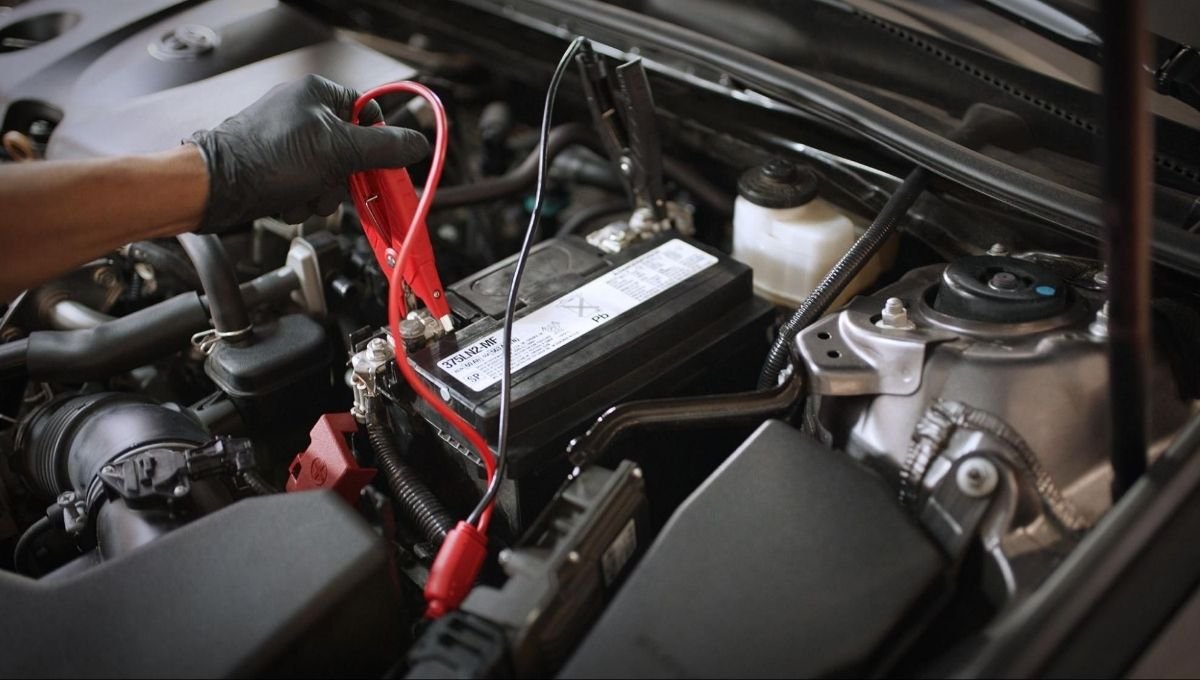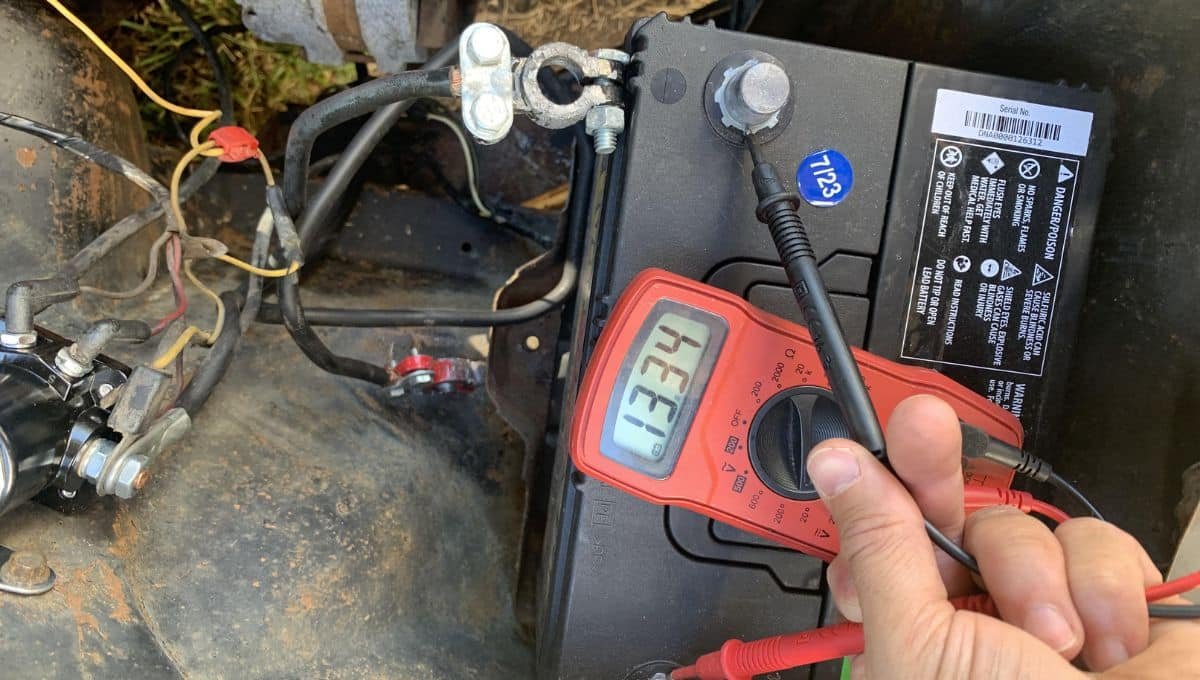Car Batteries That Will Keep Me on the Road – The Power of Efficiency!
A reliable car battery is vital for keeping your vehicle running smoothly, whether you’re on a daily commute or a long road trip. It powers essential systems like the engine, lights, and wipers, ensuring your safety.
A good battery should handle extended use, different weather conditions, and have features like high Cold Cranking Amps for cold starts, and strong reserve capacity in case of alternator failure.
Regular maintenance, including checking for corrosion and keeping it charged, extends its life. When a battery fails, jump-starting or replacement is necessary, with roadside assistance as a backup.
Introduction:
A reliable car battery is the silent sentinel of every vehicle, often overlooked until it fails. Whether you’re navigating a daily commute or embarking on a cross-country road trip, your battery ensures that your car’s engine roars to life and powers all the auxiliary systems that make modern driving a breeze.
Without a dependable battery, the risk of being stranded on the side of the road looms large, turning an otherwise smooth journey into an ordeal. Understanding the importance of a quality battery is the first step in ensuring your road safety.
The Importance of a Reliable Car Battery for Road Safety:
A car’s battery plays a pivotal role in road safety. It not only powers the engine but also ensures that essential systems like headlights, brake lights, and wipers function optimally. A faltering battery can compromise these safety features, leaving you vulnerable in inclement weather or low-light conditions.
Imagine losing power to your headlights while driving at night or your car refusing to start in the middle of nowhere. A robust battery mitigates these risks, giving you the confidence to hit the road, no matter the conditions.
What Makes a Good Car Battery for Long Journeys?
For long road trips, a good car battery is one that can withstand extended use without faltering. It should have ample reserve capacity to power all the vehicle’s electronic components, from navigation systems to entertainment units, without draining too quickly.
Additionally, it must be resilient in various weather conditions, whether you’re driving through scorching deserts or icy mountain passes. Durability, endurance, and quick rechargeability are key attributes of a battery that can accompany you on lengthy journeys.
Understanding the Basics: How Car Batteries Work

A car battery is a chemical powerhouse, converting stored chemical energy into electrical energy to start the engine and run the car’s electrical systems.
The magic happens through a series of chemical reactions between the battery’s lead plates and sulfuric acid electrolyte, producing a flow of electrons that powers the engine’s ignition system.
Once the car is running, the alternator takes over, recharging the battery while continuing to power the electrical systems. However, over time, this cycle wears down the battery, reducing its ability to hold a charge and making replacement inevitable.
The Science Behind Car Batteries: Powering Your Vehicle:
At the heart of a car battery is electrochemistry. Inside, the lead plates and acid solution interact, creating a chemical reaction that releases electrons. This flow of electrons generates the necessary electrical current to crank the engine and start the car.
Once the engine is running, the alternator replenishes the battery, ensuring a continuous cycle of power. The balance between discharge (starting the car) and recharge (alternator replenishing) keeps the vehicle operational.
When this balance is disrupted—due to wear or a malfunction—the battery’s ability to store and deliver power diminishes.
Different Types of Car Batteries: Lead-Acid, AGM, Lithium-Ion
The most common type of car battery is the lead-acid battery, a tried-and-tested technology used for decades. It’s cost-effective and widely available, though it requires regular maintenance.
Absorbent Glass Mat (AGM) batteries are a step up, providing more durability, resistance to vibrations, and maintenance-free performance, making them a favorite for newer vehicles and more rugged terrains.
On the cutting edge are lithium-ion batteries, which boast lighter weight, faster charging, and a longer lifespan, though they come with a heftier price tag.
Signs Your Car Battery Needs to Be Replaced:
A battery on its last legs won’t always give obvious warnings. However, some tell-tale signs include a sluggish engine start, dim headlights, or flickering dashboard lights.
If you hear a clicking sound when turning the ignition, or if the battery is more than three to five years old, it’s time to consider a replacement.
Other subtle indicators include electronic malfunctions or a battery warning light on your dashboard. Don’t wait until you’re stranded—proactive replacement can save you from an inconvenient roadside stop.
read also: Can I Use a Car Battery in My Travel Trailer – Find Out!
Top Features to Look for in a Long-Lasting Car Battery:
High Cold Cranking Amps (CCA) for All-Weather Performance:
Cold Cranking Amps (CCA) measure a battery’s ability to start your engine in cold temperatures. The higher the CCA, the better the battery will perform in extreme weather, especially in freezing conditions where batteries tend to lose efficiency. A battery with a high CCA ensures that, even in winter’s harshest mornings, your car will start reliably.
Reserve Capacity: How It Impacts Your Driving Experience
Reserve capacity refers to how long a fully charged battery can continue to power your car if the alternator fails. This measure is crucial for road trips, as it ensures you have a buffer of power to get to a safe location or service station.
Batteries with a high reserve capacity provide peace of mind, giving you ample time to address electrical issues without immediate panic.
Maintenance-Free Batteries: The Benefits of AGM and Gel Batteries
AGM and Gel batteries are designed to be maintenance-free, meaning you don’t need to top them up with distilled water like traditional lead-acid batteries. This makes them convenient for long-distance drivers or those who want a hassle-free solution.
Additionally, AGM batteries are vibration-resistant, making them ideal for off-road driving, while Gel batteries are known for their superior performance in deep-cycle applications, where consistent energy output is required over long periods.
Best Car Batteries for Long Road Trips

The Best Heavy-Duty Car Batteries for Off-Road Adventures
For off-road adventurers, heavy-duty batteries like the Optima YellowTop or Odyssey Extreme Series are top-tier options.
These batteries offer superior durability, resistance to vibrations, and the capacity to handle the power demands of additional accessories like winches, off-road lights, and advanced GPS systems.
Designed for rugged terrains, they ensure your vehicle keeps going, no matter how far off the beaten path you go.
Budget-Friendly Options: Reliable Batteries That Won’t Break the Bank
You don’t always need to splurge on the most expensive battery to get reliability. Budget-friendly options such as the DieHard Gold or Duralast are well-regarded for their solid performance at a reasonable price.
They offer decent reserve capacity, good cranking power, and enough durability to last for everyday use and occasional road trips.
High-End Car Batteries for Performance and Longevity:
For drivers who demand the best, high-end batteries like the ACDelco Professional or the Bosch Platinum Series offer unparalleled performance.
These batteries are built for longevity, providing exceptional power retention, quicker charging times, and robust all-weather performance. They’re perfect for those who frequently drive long distances or use power-hungry accessories like in-car entertainment systems.
read also: Does Leaving Car Unlocked Drain Battery – What You Need to Know!
Battery Maintenance Tips to Keep You On the Road:
How to Extend Your Battery’s Life: Charging and Care Tips
To maximize the lifespan of your car battery, ensure it stays charged, especially if you take short trips where the alternator doesn’t have time to fully recharge the battery.
Regularly check for corrosion around the terminals, and clean them to ensure a proper connection. Avoid letting your battery completely discharge, as this can shorten its lifespan.
Seasonal Battery Care: Summer Heat vs. Winter Cold
Both extreme heat and cold can take a toll on your battery. In summer, high temperatures can cause the fluid in lead-acid batteries to evaporate, leading to a loss of charge.
In winter, cold weather reduces the battery’s ability to hold a charge. Checking your battery before seasonal shifts, and making sure it’s fully charged, can help avoid unexpected failures.
Troubleshooting Common Car Battery Problems:
Common issues like corroded terminals, loose connections, or a dying battery can leave you stranded. Regularly inspect your battery for signs of wear, and use a multimeter to check its voltage.
If it drops below 12.4 volts when the car is off, it may be time for a replacement. Also, ensure the alternator is functioning properly, as a faulty one can cause a battery to drain faster.
What to Do When Your Battery Dies on the Road:

Emergency Solutions: Jump Starting Your Car
In the unfortunate event that your battery dies while you’re on the road, jump-starting is often the quickest solution. Always carry a set of jumper cables and know how to safely use them.
Connect the positive and negative terminals correctly, ensuring both cars are in park and the engines are off before starting the process. Once your car starts, let it run for a while to recharge the battery.
How to Safely Replace Your Car Battery on the Go:
If a jump-start doesn’t work and you have a spare battery on hand, you can replace it yourself. Ensure the vehicle is turned off, disconnect the negative terminal first to avoid sparks, and then the positive.
Remove the old battery, clean the tray and connectors, and install the new one by connecting the positive terminal first, then the negative.
Best Roadside Assistance Services for Battery Failures:
When DIY solutions aren’t feasible, roadside assistance services can be a lifesaver. Companies like AAA or specialized services through your car manufacturer can quickly provide battery jump-starts or replacements on the spot. Having a membership ensures you’ll never be left without help, no matter where the road takes you.
read also: Why Is My Car Jerking After a Battery Change – Comprehensive Guide!
FAQ’s
1. What makes a car battery reliable for long road trips?
A reliable car battery should have high reserve capacity, strong Cold Cranking Amps (CCA) for starting in cold weather, and durability to handle various conditions, ensuring smooth operation over extended journeys.
2. How do I know if my car battery needs to be replaced?
Signs of a dying battery include a slow engine start, dim headlights, flickering dashboard lights, and a clicking sound when turning the ignition. If your battery is over three to five years old, it may be time to replace it.
3. What is the difference between AGM and lead-acid car batteries?
AGM (Absorbent Glass Mat) batteries are maintenance-free, more resistant to vibrations, and offer better durability than traditional lead-acid batteries, which require regular maintenance and water top-ups.
4. How can I extend the life of my car battery?
To extend your battery’s life, ensure it stays charged, regularly check for corrosion, clean the terminals, and avoid letting the battery fully discharge.
5. What should I do if my car battery dies on the road?
If your battery dies on the road, you can jump-start it using jumper cables or replace it if you have a spare. If these options are not available, roadside assistance services can help with on-the-spot replacements or jump-starts.
Conclusion
Choosing the right car battery is essential to keeping your vehicle running smoothly and safely, whether on a short drive or an epic road trip. Maintaining your battery with proper care and timely replacement ensures you’ll stay on the road, free from unexpected breakdowns. By investing in the right battery and following best practices for care, you can enjoy countless miles of worry-free driving.
Read Also:
Does Leaving Car Window Open Drain Battery – Find Out Now!
Replaced Alternator and Battery But Car Still Dies – Troubleshooting Guide!
Can I Jump an RV Battery with My Car – Key Facts You Need!
Can a Bad Battery Cause Surging – The Hidden Danger!














Post Comment